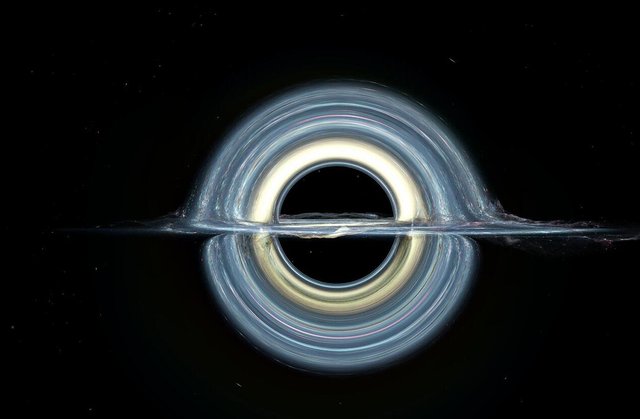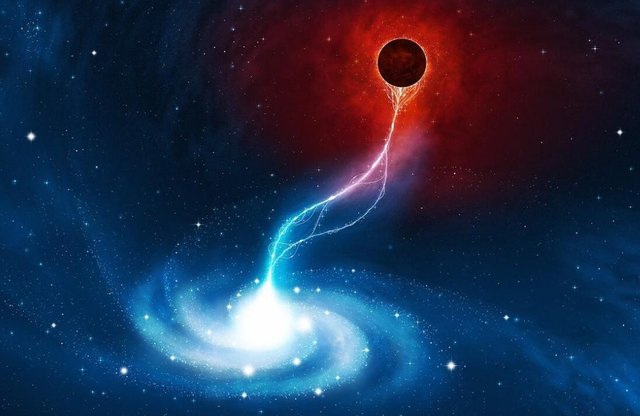
In Einstein's general theory of relativity, a wormhole is a special scheme that describes an equation that connects two points in space or time through a channel. The length of this passage is shorter than the actual distance between these two points, so that the wormhole becomes a shortcut. Although many science fiction novels like to write about wormholes to appeal to the public, wormholes are only a hypothesis in the scientific community, and scientists have never found a way to maintain the stability of wormholes in the real world.
Origin of the term "wormhole".
In the mid-1930s, Einstein and Rosen proposed the simplest solution to wormholes, also known as the Einstein-Rosen Bridge. Einstein and Rosen later also proposed the concept of "white holes". A "white hole", like a "black hole", contains a singularity, but it operates in the opposite way to a black hole. No matter can enter the region of the white hole, and all matter inside the white hole will be thrown out. Moreover, Einstein and Rosen found that each black hole is theoretically paired with a white hole and exists in a different location in space.

Why is it that wormholes can "travel"?
In fact, the role of a pair of black holes and white holes is not as big as it seems. First of all, white holes are unstable. Because no matter can enter a white hole. When the energy of the system increases to infinity, the white hole will be blown up. Even if the white hole could exist, the only way to enter the wormhole is to cross the black hole region on the other side. But once a matter has traversed this region, it can never escape. Then the conclusion is that even if the object can enter the wormhole, it can only stay inside forever. But in fact, wormholes are extremely unstable, and even a photon passing through a wormhole tunnel can bring a huge amount of energy to the system so that the tunnel will break and destroy the wormhole.
In the 1970s, physicists worked out the mathematical solution needed to create a stable wormhole, said Dennis Wang, a physicist from the University of California, Santa Barbara. The solution was roughly to move the entrance to the wormhole outside the black hole region and to keep the tunnel from immediately and irreversibly collapsing as matter passed through. The key factor in stabilizing a wormhole like this is to find matter with negative mass. But this negative mass matter has not been found so far, and it violates the law of conservation of kinetic energy.

What is the shape of a wormhole?
If a wormhole really exists, it would probably have a very strange appearance. Its entrance would look like a sphere, the same as the surface of a planet. The light inside it comes from the other end when viewed from the entrance. The length of a wormhole tunnel is not certain. In the tunnel, we would see images of distorted areas of the universe at both ends of the entrance and exit.
The so-called time travel through the wormhole
If wormholes are treated as time machines. In terms of special relativity, a person approaching the speed of light is slower in time than a person at rest, for example, slower in age. If a wormhole is constructed, initially the entrance and exit times are synchronized. When one end, say at the entrance, has matter accelerated to near the speed of light, then time at that end will be lost more slowly than at the other end, creating two entrances. The two entrances can overlap, but at this point one of the entrances will be in the past of the other one. Thus the time machine is formed, and if we want to go back in time, then we only need to go through one end. When we leave the wormhole, we will find ourselves in the past.

The principle of wormhole formation
First of all, it is important to emphasize that there is no concrete way to create wormholes and that they are purely a hypothesis.
The vacuum of space-time is filled with quantum fields, which are the fundamental quantum structures that make up forces and particles, and these quantum fields contain energy within them. When the quantum energy of a particular region is lower than its surroundings, the energy of that region is a negative energy relative to the surrounding region. This negative energy exists in the form of the Casimir effect. But no one knows if this negative energy can be used to stabilize wormholes. Or it is not really negative energy at all, because it is only negative energy in phase, not in absolute terms.
Perhaps wormholes occur naturally in microscopic worlds at the quantum level, where space-time flips at the tiniest scale. Wormholes may keep appearing and disappearing suddenly. Maybe one day scientists will discover ways to "amplify" these wormholes and keep them stable!